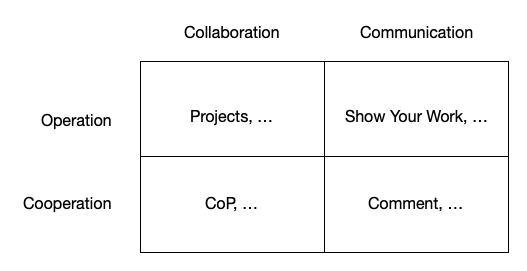Unpacking collaboration and cooperation?
Author: Clark
Go to Source
My colleague, Harold Jarche (the PKM guy), has maintained that cooperation is of more value than collaboration. And for good reason, because cooperation comes from internal motivation instead of external direction. But this has bugged me, so I naturally tried to make a diagram that helps me think about it. So here’s a stab an unpacking collaboration and cooperation.
His argument, most convincingly can be summed up in this quote (I’ve simplified) he takes from Stephen Downes:
collaboration means ‘working together’. That’s why you see it in market economies…
cooperation means ’sharing’. That’s why you see it in networks…
That is, when you’re offering to work together without some recompense, it’s a higher order. And I agree.
However, I like to think of collaboration as a higher form of thinking. That is, working together to generate a new, negotiated understanding richer than any we could generate on our own. Cooperation means I point to something or give you some feedback, but we’re not necessarily engaged in creation.
The question is how to reconcile this. And it occurred to me to pull it apart a bit. Because I’ve seen, heck I’ve participated in exercises where we collaborate for the greater good. Sharing. So I wondered if I might tease out two dimensions.

I wondered whether there are two types of cognitive actions, e.g. collaboration and communication. That is, for one you’re just offering pointers or opinions, without necessarily having any skin in the game. In the other, you’re actively working with someone to generate a new interpretation.
That’s coupled with a second dimension, whether the goal has been dictated externally (e.g. here team, find a solution to this problem) or has emerged from the participant. It’s about locus of control.
You end up with different types of categories. If someone’s asked you to collaborate, it’s likely some sort of project team. Less intently, it may be a ‘show your work’ type of thing, where the organizational culture is supporting sharing, but it’s also an expectation.
On the other hand, you can be just contributing to others by commenting on their blog posts (hint hint, nudge nudge, wink wink). Or you could be part of a Community of Practice and actively trying to improve something.
And I could be totally missing the nuances he’s talking about.
I don’t know if this addresses the issue or not, but it’s my stab at unpacking collaboration and cooperation. And I share it, because I’m wrestling with it, and it’s how I learn out loud. I invite your thoughts.
The post Unpacking collaboration and cooperation? appeared first on Learnlets.
